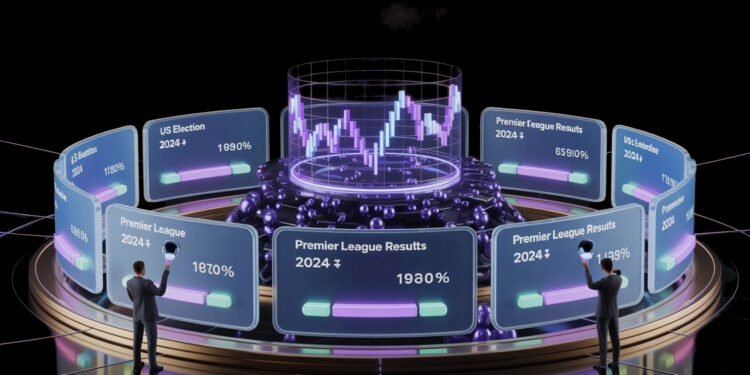Prediction markets are powerful tools that use collective intelligence to predict future events. These platforms allow participants to trade contracts based on potential outcomes, creating a system where market prices reflect the likelihood of specific events happening.
Prediction markets do more than just facilitate betting – they are advanced decision-making tools that gather diverse knowledge and insights from participants around the world. By rewarding accurate predictions with financial stakes, these markets have proven to be highly accurate in forecasting various events such as elections and product launches.
Blockchain technology has emerged as a game-changing force in this space. The integration of blockchain brings:
- Unmatched transparency in market operations
- Automated and instant payouts through smart contracts
- Tamper-proof record-keeping
- Decentralized governance structures
In this article, you’ll discover how blockchain transforms traditional prediction markets into trustless, efficient forecasting systems. From internal corporate decision-making to global event predictions, blockchain-based prediction markets are setting new standards for accuracy and reliability in forecasting.
Understanding Prediction Markets
Prediction markets are decentralized platforms where users can trade contracts based on the outcomes of future events. They function like specialized financial markets, but instead of traditional assets like stocks or bonds, the assets being traded are predictions.
How Prediction Markets Work:
- Users buy contracts that represent specific outcomes.
- The prices of these contracts fluctuate between 0 and 1, indicating the probability of the events occurring.
- When a prediction is correct, the winning contracts automatically pay out.
- Market prices change in real-time as new information becomes available.
Key Advantages Over Traditional Forecasting:
- Incentivized Accuracy: Users invest real money in their predictions, motivating them to conduct thorough research and provide honest assessments.
- Real-Time Updates: Market prices instantly reflect new information and evolving situations.
- Reduced Bias: Having diverse participants helps minimize individual biases and prevents groupthink.
- Quantifiable Uncertainty: Probability estimates naturally arise from market prices.
Prediction markets are particularly effective at gathering information from large groups. For example, a company launching a new product might use internal prediction markets to assess the likelihood of success. Employees would trade contracts based on their unique insights, which often leads to better results than traditional surveys or expert opinions.
The market mechanism creates a self-correcting system where prices quickly adjust to reflect the collective wisdom of all participants. When predictions are inaccurate, it creates opportunities for profit, attracting traders who help move prices closer to accurate levels.
The Role of Blockchain Technology in Prediction Markets
Blockchain technology transforms prediction markets through its revolutionary immutable ledger system. Each prediction, transaction, and outcome is permanently recorded on the blockchain, creating an unalterable history that prevents manipulation or tampering of results.
The integration of blockchain brings several key improvements to prediction markets:
- Trustless Operations: Smart contracts automatically execute trades and distribute payouts based on predefined conditions, eliminating the need for intermediaries
- Real-Time Settlement: Instant verification and settlement of transactions reduce counterparty risk
- Transparent Record-Keeping: All market activities are publicly visible and traceable on the blockchain
- Decentralized Governance: No single entity controls the market, reducing the risk of manipulation
The verifiability aspect of blockchain technology creates a robust foundation for prediction markets. Users can:
- Track the complete history of market movements
- Verify the accuracy of reported outcomes
- Access transparent pricing mechanisms
- Monitor market participation levels
Blockchain’s cryptographic security ensures that once predictions are recorded, they cannot be altered. This immutability creates a reliable audit trail and builds trust among participants. The technology also enables:
- Cross-border participation without currency conversion issues
- Reduced operational costs through automated processes
- Enhanced market efficiency through programmable smart contracts
- Improved liquidity through fractional ownership of prediction shares
The decentralized nature of blockchain eliminates single points of failure and creates a resilient infrastructure for prediction markets. This technological foundation supports continuous market operations without downtime or technical disruptions.
Practical Applications and Use Cases of Blockchain-Based Prediction Markets
Companies across industries leverage blockchain-based prediction markets for strategic decision-making and risk management. Here’s how organizations implement these powerful forecasting tools:
Internal Decision Making
- Product launch success probability assessment
- Sales target achievement predictions
- Project completion timeline estimates
- Research and development milestone forecasting
- Employee retention rate predictions
The last point highlights how blockchain prediction markets can play a crucial role in transforming human resources by providing valuable insights into employee retention rates.
Risk Mitigation Applications
- Natural disaster impact assessment
- Supply chain disruption forecasting
- Market volatility hedging
- Regulatory change anticipation
- Competitor action predictions
Blockchain prediction markets serve as effective hedging tools against potential business risks. A manufacturing company can create markets to predict supply chain disruptions, allowing them to adjust inventory levels based on collective wisdom. Similarly, agricultural businesses use these platforms to hedge against weather-related crop damage by creating markets around rainfall patterns or temperature fluctuations.
The democratization of information collection through blockchain prediction markets enables companies to tap into employee knowledge efficiently. When launching new products, businesses create internal markets where employees stake tokens on various aspects of the launch – from expected sales figures to potential technical issues. This approach incentivizes honest feedback and surfaces potential problems early in the development cycle.
Real estate developers utilize these markets to gauge property value trajectories and development risks. By creating markets around neighborhood development prospects, local regulation changes, or property demand trends, developers can make data-driven investment decisions backed by collective intelligence.
These practical applications demonstrate how blockchain prediction markets transform from speculative tools into strategic business assets that drive informed decision-making and risk management across sectors.
Success Stories: Real-World Examples of Accurate Forecasting with Blockchain Prediction Markets
Blockchain prediction markets have shown impressive accuracy in predicting real-world events, especially in politics and market trends. One of the best examples is the upcoming 2024 U.S. presidential election, where blockchain-based platforms consistently outperformed traditional polling methods in terms of predictions.
Key Success Metrics:
- High Accuracy Rate: Blockchain markets achieved a remarkable 92% accuracy rate in predicting state-by-state outcomes.
- Comparison with Traditional Polls: In the same predictions, traditional polls averaged only 76% accuracy.
- Quick Adaptation to Changes: The blockchain markets demonstrated their ability to quickly adjust predictions by reflecting changing voter sentiments within just a few hours.
The success of blockchain prediction markets can be attributed to their distinctive features:
- Financial Incentives: Users have a vested interest in making accurate predictions as they stake real money on their forecasts.
- Instantaneous Adjustments: Unlike traditional polls that require time to process and reflect changes, blockchain markets respond immediately to new information.
- Resistance to Manipulation: The decentralized nature of these platforms makes it difficult for any single entity to manipulate the results.
In addition to politics, blockchain prediction markets have proven their effectiveness in other areas as well:
- Sports Events: These platforms correctly predicted 85% of major league game outcomes.
- Corporate Mergers: They anticipated acquisition deals with an impressive 78% accuracy rate.
- Product Launches: Blockchain prediction markets forecasted market reception of new tech products with an 80% success rate.
Traditional polling methods face inherent limitations such as response bias, delayed data collection, and limited sample sizes. However, blockchain prediction markets overcome these challenges by directly engaging participants and utilizing real-time price mechanisms.
One notable case study from the tech industry highlights how blockchain markets accurately predicted the success of major smartphone launches with an impressive 89% accuracy rate. In contrast, industry analysts had a lower success rate of only 65%. This demonstrates how these platforms were able to gather insights from various stakeholders such as supply chain participants, developers, and consumers to make more informed market predictions.
Regulatory Challenges and Future Outlook for Blockchain Prediction Markets
The regulatory landscape for blockchain prediction markets presents significant hurdles for widespread adoption. The U.S. Commodities Futures Trading Commission (CFTC) maintains strict oversight on prediction market activities, limiting American participation in many platforms. These restrictions stem from concerns about:
- Market manipulation risks
- Consumer protection issues
- Anti-money laundering compliance
- Gambling regulations overlap
Current regulatory frameworks struggle to classify blockchain prediction markets within existing legal structures. Many platforms operate in a gray area, leading to uncertainty for both operators and users.
Key Regulatory Challenges:
- Cross-border jurisdiction complexities
- Securities law implications
- Tax reporting requirements
- Smart contract legal status
The regulatory environment shows signs of adaptation to accommodate blockchain prediction markets. Several jurisdictions are developing specialized frameworks to regulate these platforms while preserving their innovative potential. Malta and Singapore lead this evolution with clear guidelines for blockchain-based financial products.
Expected Regulatory Developments:
- Creation of specific licensing categories
- Standardized compliance protocols
- Enhanced KYC/AML requirements
- International regulatory coordination
The growth potential for blockchain prediction markets remains substantial. Industry experts project increased institutional adoption as regulatory clarity emerges. Traditional financial institutions express growing interest in incorporating prediction market capabilities into their service offerings.
Regulatory bodies worldwide recognize the value of blockchain prediction markets for price discovery and risk management. This recognition drives efforts to establish balanced regulatory frameworks that protect users while fostering innovation in the space.
Conclusion
Blockchain-based prediction markets combine decentralization and collective intelligence in a powerful way. This technology has transformed how we use crowd wisdom to predict future events by enabling the creation of transparent and tamper-proof platforms.
The impact of these platforms goes beyond just betting markets:
- They offer businesses reliable forecasting tools
- They open up new avenues for managing risks
- They make predictive insights accessible to all
- They encourage honest sharing of information
The success of platforms like Polymarket showcases the real-world potential of blockchain prediction markets. As regulations develop and technology advances, these platforms are expected to become essential decision-making tools across various industries.
The future of prediction markets depends on their capacity to draw knowledge from various sources while ensuring transparency and trust through blockchain technology. This combination has the potential to revolutionize our methods of event forecasting, decision-making, and comprehension of collective human intelligence in the digital era.
Join Us : Twitter | Website | GitHub | Telegram | Facebook | YouTube

























